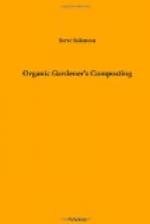Probably without realizing it, many non-gardeners have already scuffed up that thin layer of nearly pure humus forming naturally on the forest floor where leaves and needles contact the soil. Most Americans would be repelled by many of the substances that decompose into humus. But, fastidious as we tend to be, most would not be offended to barehandedly cradle a scoop of humus, raise it to the nose, and take an enjoyable sniff. There seems to be something built into the most primary nature of humans that likes humus.
In nature, the formation of humus is a slow and constant process that does not occur in a single step. Plants grow, die and finally fall to earth where soil-dwelling organisms consume them and each other until eventually there remains no recognizable trace of the original plant. Only a small amount of humus is left, located close to the soil’s surface or carried to the depths by burrowing earthworms. Alternately, the growing plants are eaten by animals that do not live in the soil, whose manure falls to the ground where it comes into contact with soil-dwelling organisms that eat it and each other until there remains no recognizable trace of the original material. A small amount of humus is left. Or the animal itself eventually dies and falls to the earth where ....
Composting artificially accelerates the decomposition of crude organic matter and its recombination into humus. What in nature might take years we can make happen in weeks or months. But compost that seems ready to work into soil may not have quite yet become humus. Though brown and crumbly and good-smelling and well decomposed, it may only have partially rotted.
When tilled into soil at that point, compost doesn’t act at once like powerful fertilizer and won’t immediately contribute to plant growth until it has decomposed further. But if composting is allowed to proceed until virtually all of the organic matter has changed into humus, a great deal of biomass will be reduced to a relatively tiny remainder of a very valuable substance far more useful than chemical fertilizer.
For thousands of years gardeners and farmers had few fertilizers other than animal manure and compost. These were always considered very valuable substances and a great deal of lore existed about using them. During the early part of this century, our focus changed to using chemicals; organic wastes were often considered nuisances with little value. These days we are rediscovering compost as an agent of soil improvement and also finding out that we must compost organic waste materials to recycle them in an ecologically sound manner.
Making Compost
The closest analogies to composting I can imagine are concocting similar fermented products like bread, beer, or sauerkraut. But composting is much less demanding. Here I can speak with authority, for during my era of youthful indiscretions I made homebrews good enough have visitors around my kitchen table most every evening. Now, having reluctantly been instructed in moderation by a liver somewhat bruised from alcohol, I am the family baker who turns out two or three large, rye/wheat loaves from freshly ground grain every week without fail.




